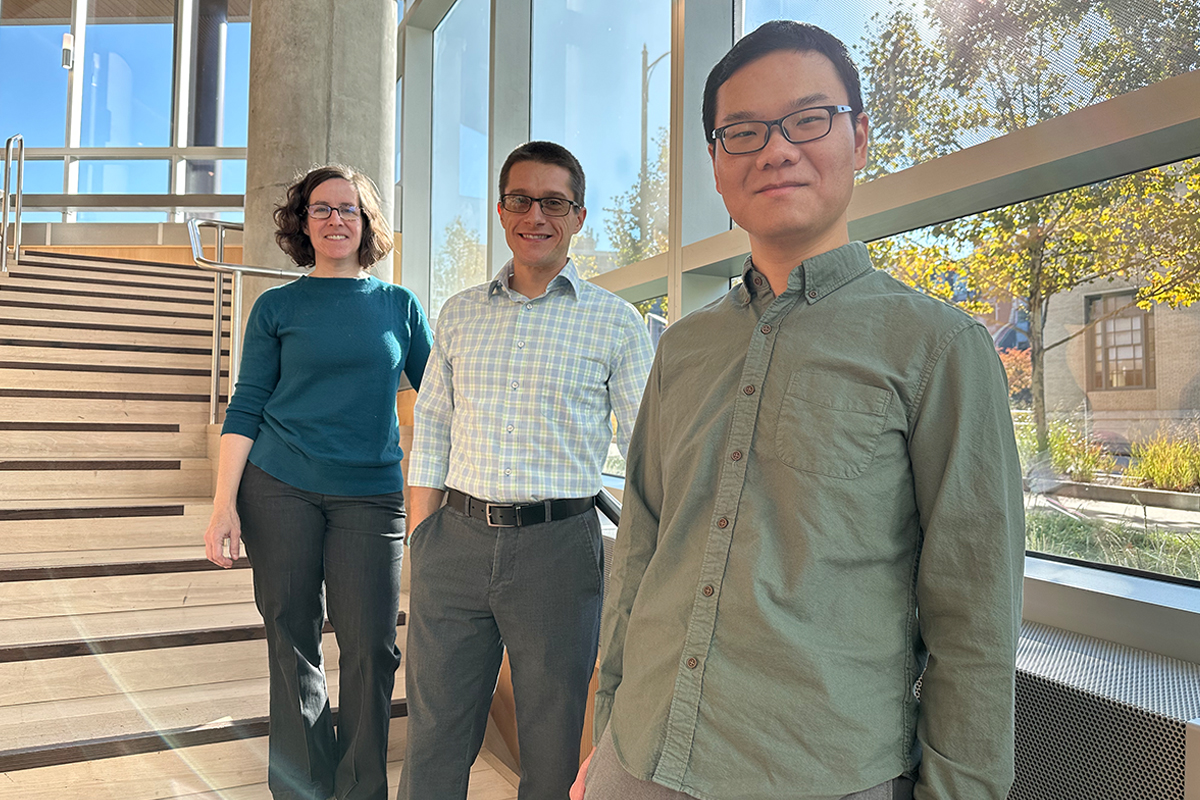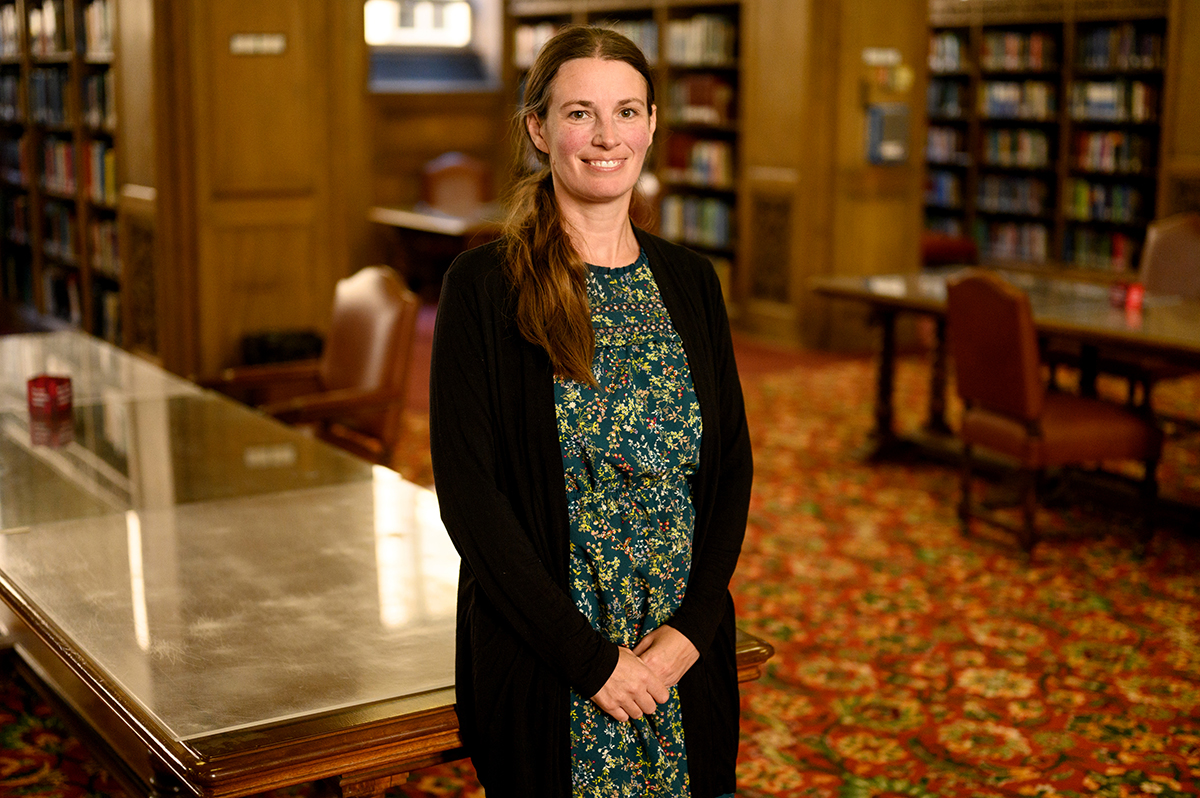
(Left-Right) Sarah Young, Ryan Splenda, and Haoyong Lan | Melanie Gainey (See Below)
At the University Libraries, liaison librarians are information specialists with extensive knowledge of disciplinary information sources and research methods, who can help with everything from a first-year assignment to dissertation work and grant-funded research projects across Carnegie Mellon. One group ready to bring their expertise to a broad range of projects, either as a consultant or a collaborator, is the Evidence Synthesis Service team.
Evidence synthesis is a type of research method designed to bring together all relevant information on a research question, in order to identify gaps in knowledge, establish an evidence base for best-practice guidance, or help inform policy-making and practice. It includes methods such as systematic reviews and meta-analyses, scoping reviews, systematic mapping reviews, and rapid reviews.
“These projects are much more involved than a basic literature review – you use existing research as your subject matter, but discover new trends and make new connections,” explained Principal Librarian Sarah Young, one of the primary contacts for the team. “They tend to be long-term, in-depth collaborations across departments that typically last for multiple years. New findings can really impact policy making, decision making, and clinical practice, and they have implications in student learning, data and information literacy, and open science.”
Librarians trained in evidence synthesis methods are able to provide support in many stages of the review process. They can offer guidance on methodology and databases, and design and implement comprehensive and reproducible database-specific search strategies. They’re ready to assist in the use of citation management software for deduplication of records and offer best practices for the documentation and reporting of searches. They can even offer guidance on performing comprehensive literature reviews for IACUC protocols or grant proposals.
As a consultant, librarians can provide background information on evidence synthesis methods, guide researchers through designing comprehensive, reproducible searches, and offer peer-review of search strategies. For projects that require more support, they are also able to join as a co-author. In this role, they can help refine research questions, design, run and manage database and gray literature searches, write the search and retrieval portion of the methods section of the paper, and more.
“Universities that have library services for evidence synthesis really enable researchers to do this kind of work,” Young said. “Some of these projects would not have happened without this specific expertise that we bring to the table.”
Currently, the team is involved in a variety of complex projects across multiple disciplines. One systematic review, focusing on business, examines the question: “Does executive compensation predict publicly traded firms’ financial performance or inaccurate financial reporting?” This project, led by H.J. Heinz II University Professor of Organizational Behavior and Public Policy Denise Rousseau, will serve as a proof-of-concept for conducting high quality systematic reviews in business and management.
Another study, this one in biomedical and chemical engineering, is a scoping review that addresses the following question: What is the relationship between nanoparticles used for cancer theranostics and macrophage polarization in the tumor microenvironment? A collaboration with Biomedical Engineering and Chemical Engineering Assistant Professor Elizabeth Wayne, this project has also led to the development of a course that explores using evidence synthesis as a model for undergraduate research.
“This level of collaboration with faculty is very rewarding as a liaison librarian,” said Open Science Program Director and Librarian Melanie Gainey, who has been working on the project with Wayne. “It’s a prime example of true partnership in both research and teaching, and provides liaisons with an opportunity to form impactful, long lasting relationships with various researchers in their fields.”

Evidence synthesis research may be less well known than other types of inquiry, especially outside of medical research, but it is just as rigorous and valuable, and there are meaningful opportunities to share discoveries.
“There are outlets that align with this type of research that really benefit different disciplinary areas — for example, in business, the Academy of Management Annals journal publishes up-to-date, in-depth reviews that summarize or challenge current assumptions and new advances,” Librarian Ryan Splenda, who liaises with Tepper, explained.
This year, a number of evidence synthesis projects in various stages are beginning to show exciting results. In the coming months, the Evidence Synthesis Service team will be sharing some of their work with the campus community to encourage other researchers to reach out about potential new projects.
“Sharing these successes is a great way to let people know that we have this expertise, and get the word out about our service,” Young said. “If you’re working on a project that might benefit from our support, we’d love to hear from you!”
To collaborate with the Evidence Synthesis Service, submit a consultation request or reach out to the team. You can also learn more in the Evidence Synthesis Research Guide.
by Sarah Bender, Communications Coordinator
